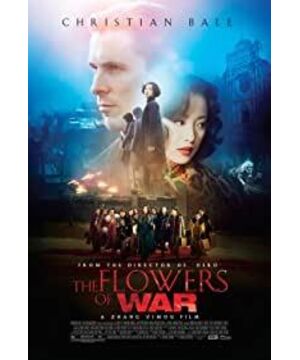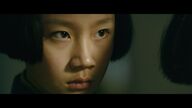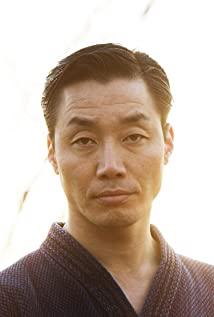This is a legendary tragic story. The special historical background attached to it has a natural attraction to filmmakers, but the interpretation of the story is too big, and if it cannot be convincing, it will be the biggest trouble. In the hands of screenwriter Liu Heng, the proficient screenwriting skills worked hard to erase the wrinkles on the wall, and the director Zhang Yimou rarely tried his best to restrain his past bad habits of over-decoration. The joining of powerful actor Christine Bell made the performance even more impressive. All of this makes the whole movie look well-rounded, sophisticated, and quite impactful, but in the end, the core of the story, the decision of the prostitutes to sacrifice themselves to save the female students, its credibility is still questionable-it It still seems to be given and imposed by the author-this is this unsuccessful film, the biggest regret.
1. Proposition
December 13, 1937, was the day when Nanjing fell.
The next day, fifty thousand Japanese troops entered the city, and the ancient capital of the Six Dynasties in the ruins became the meat restaurant of this beast army. From this day on, Japanese soldiers began a massacre that shocked the world for more than three hundred thousand prisoners of war and civilians for more than eight months. The novel "Thirteen Hairpins in Jinling" by the American writer Yan Geling tells an incredible story that took place in the hellish city of Nanjing three days and three nights after the Japanese army entered the city.
If this is not the most tragic and noblest story created by Chinese writers so far with the Nanjing Massacre as the background, it must be the most bizarre and legendary story. Yan Geling’s past novels like to write female legends in extreme dilemmas with the background of great history, while the director Zhang Yimou, who is criticized by the Chinese for short stories, smells the golden moral value and business in this thin novel. prospect. However, anyone who wants to choose to put this story on the screen in today’s China will undoubtedly take a high risk that is not hard to imagine (in fact, Mr. Christine Bell’s small country trip brought The serious consequences make us realize that the various potential risks are far beyond the imagination of ordinary people). First of all, you cannot avoid doubts about the suffering of trafficking. Of course, even if it is rigorous such as "Schindler's List", you have to face this problem for a long time. Such doubts are sometimes relatively cheap; secondly, Against the background of the deep suffering of this nation, the suspicion of consuming prostitutes and consuming eroticism is not completely unfounded. Mr. Zhu Dake’s "Thirteen Hairpins' Erotic Patriotism", even if the timing is not right, cannot be completely regarded as just From the ground up-the sincere desire to trace the national catastrophe and the entertainment performance that exaggerates the prostitutes to resist Japan, one requires seriousness and rigor, while the other is difficult to avoid sensationalism. The power of the two sides may dissolve each other. Zhang Yimou will not be without trade-offs. The counselors around him must have repeatedly stated their interests, but in the end he still refuses to give up this rare "good story." Then, making the story credible became the top priority of all work. Zhang Yimou hired one of the best screenwriters in China, Liu Heng, to outline the narrative blueprint for the film.
A mature screenwriter will soon find the fulcrum of this story. He clearly realizes that what he is facing is actually a "devil's bargain" similar to "Sophie's Choice".
"Sophie's Choice" is an autobiographical novel by contemporary American novelist William Styron. It was once known as "a milestone in the history of Western novels and one of the 100 best English novels in the 20th century." This may be too acclaimed. , But the story itself is indeed quite moving. The protagonist of the story, Sophie, is a Polish woman who was persecuted by the Nazis during the Second World War. Her life was completely destroyed by a painful choice in a concentration camp: during her detention in a concentration camp, the Nazis forced her to choose between her two children, one Staying, the other one will be sent to the crematorium, Sophie's heart is twisted, and in front of the devil's unreasonable proposition, she chooses to keep her son. This choice did not save anyone, but ruined her life. It is worth mentioning that the core of Feng Xiaogang's well-recognized drama "The Great Tangshan Earthquake" also comes from the reorganization of this allusion. Yes, good stories, always told.
The novel "Jinling Thirteen Hairpins" faces a similar dilemma: who should sacrifice for prostitutes and female students?
There is no Sufi in this story (the false priest Miller is really not qualified to make such a choice), so in "Jinling Thirteen Hairpins", the Nazis and Sufis may be the same person. That is the author himself. But authors of popular novels generally don’t let this incomprehensible moral anxiety bother her writing. Therefore, she cleverly introduced a “heroic plot”-let the “Thirteen Hairpins” make this choice by themselves, which makes things sublime. , Become a savior, a victim, and a hero. This may be the biggest difference between popular works and serious works-the author of popular works is willing to act as the hand of God, freely fiddle with the behavior of the characters and determine their fate. She may not love Yumo at all, and is even willing to exploit their special identities in her bones. In the truly serious and profound works, the author is Sophie, the reader, and the pianist himself.
The script follows this technique (it has no choice). Therefore, this choice is not only the splendor of the story, but also the biggest trap and weakness of the story. The weakness is that this climax in the film is not the end of the narrative, but the starting point of all narratives, because all the hard work, all the homework, all the drama skills will be made to promote this result and make this choice believable.
Is "Jinling Thirteen Hairpins" finally believable?
2. Is the transformation of the characters credible?
The screenwriter Liu Heng, who was born as a novelist, has profound literary skills. The most impressive aspect of his script is the texture of the dialogue. He can write first-class lines, and the greatest effect of first-class lines is to bring a strong sense of entry. However, it is a pity that when faced with this sensitive subject, the script has not been able to devote all efforts to the exploration of the characters' deep personalities, and there are still regrets in many places. Sometimes, this may not be a matter of screenwriting ability, but a proposition. Liu Heng’s other script "Iron Man" also has this problem. For some reason, the movie with the first theme does not require and does not allow him to dig deeper into the character (Wang Jinxi), so he only spends his energy on the plot. In the line, the audience finally saw Wang Jinxi who had been beaten up with blood, and his head was full of emotions. The problems faced by "Jinling Thirteen Hairpins" are the same. This incredible proposition cannot be changed, and digging deep into the characters cannot completely solve this problem.
The ultimate goal in the narrative of this story is to make the story climax, the colorful movement, and the choice of "exchange" made by the prostitutes seems moving (because it is impossible to be credible), so all the previous narratives are all Carefully pave the way.
Before the film was released, American film critic Dodd McCarthy published a commentary in The Hollywood Reporter, expressing his doubts, and the doubts were mainly directed at the transformation of the core characters. Misconduct people, when they are called on to engage in great selfless actions, will reveal the noble emotions and morals that were hidden before. But no matter from the real world or the movie itself, the environment and the way of this great change are all It is unreal and incredible. The calculations and measurement are omitted, which greatly reduces the credibility of the final result, or the strength it should have."
Dodd McCarthy talks about the two main characters in the film Both (American Miller and the prostitute Yumo) are difficult to agree with. I personally think that Miller's change may be more hasty, but Yumo's change is traceable and basically established. The script is the final transformation of Yumo, laying no less than five layers of bedding: the
first layer of bedding is the first time Japanese soldiers rushed into the church. Faced with the prostitutes who might be exposed, Shujuan chose to leave the cellar and let Yumo and his sisters were saved, but the female students were almost raped (one of them fell to his death). For Yumo, this was a life-saving grace. This is gracious.
The second layer of foreshadowing was a conversation between instructor Li and Yumo. The teaching team that could have withdrawn from Nanjing City was originally killed in order to cover this group of female students. They could not die in vain. For Yumo, it was. A dying entrustment from a peer. This is righteousness.
The third layer of foreshadowing is Miller’s transformation. Miller, a coveted "second-rate son", this outsider, for this group of children, can do this righteous act, making Yumo feel that the children really have a good chance of surviving. Make their sacrifice meaningful. This is value.
On the fourth layer, it was Miller who confessed to Yumo about the tragic death of the woman who was looking for the strings. This made Yumo's heart palpitating. From this, she thought of her own life experience. She went to a church school and was the first time she picked up guests at this age, so she I believe that children cannot be abused or killed. This is the emotional basis.
On the fifth floor, Shujuan took the children to climb the clock tower and wanted to commit suicide by jumping off the building, which directly led Yumo to make her choice. This is urgency.
Therefore, Yumo's changes and choices make sense. Her choice is the humanitarianism of a woman with a church education background. Any adult in such a scene, for the sake of children, can do this. What doesn’t make sense, is that other women made the same choice quickly and decisively under her inspiration, and most of these people are obscure, and we can’t see them with such progressive layers. , So the script cleverly arranged the little mosquito’s fear and repentance before getting into the car the next day, which is a very necessary patch. But the patch is just a patch. There are also female audiences who are keenly aware that the choice of prostitutes (not Yumo's choice) has a naive side. The author may have exploited their humble sense of profession and identity, "Business women do not know the hatred of the country, but they still sing The quotation of the verse "The Flower in the Backyard" was a touch that moved people at the time and made people feel unpleasant afterwards. The prostitutes, as the subject of sacrifice, did not get enough pen and ink to analyze in detail. They are still a humble group that is simply given action. Therefore, Yumo chose to be a "hero" with a complete conscious process, while other prostitutes, inspired by her, imagined the value of spiritual sublimation. If even being a hero is still the collective unconscious, where is the advanced nature of this story? It does have the suspicion of a cleverly wrapped theme narrative.
This is the most regrettable part of the whole play. It is not credible.
In addition, Miller's transformation is obviously even less convincing. It was the first time that Japanese soldiers rushed into the church and attempted to rape female students. Miller’s coming forward is credible. This is a kind of ordinary humanitarianism and heroism. When he went out looking for two prostitutes and met his fellow countrymen, he had a chance. When escaping from Nanjing but choosing to give up, the plot handling was a bit sloppy. Of course, we all remember that Miller later confided in Yumo. He told Yumo that if his daughter was alive, she would be 12 years old, just as old as the female students. But is this enough? This is also a patch. In the narrative, the characteristic of the patch is that if it is not patched, it will reveal a flaw, and if it is patched, it means that there was a flaw here.
Compared with Miller’s transition from “bad” to “good”, his pain and entanglement are particularly lighter, especially since he has just witnessed the bloody scene of two women being tortured and killed (I believe the realism created by this scene will It makes all the audience shudder), I can hardly accept that he would simply acquiesce in "the woman he loves" to make such a "great decision" and put it into action without any signs of collapse-this collapse, imagine if Yumo is yours Daughter, your girlfriend, should not be difficult to understand.
Dodd McCarthy has a very appropriate term: incredible.
But because the script was completed smoothly as a whole, at least during the 145 minutes of sitting in the cinema, we had no time to think about it. You can only follow the ups and downs of the character's fate, believing everything in fear and depression.
3. A really good movie will not only stop at the story level. A
really good movie must of course have a good story, but it will never stop at the first level of the story.
Thirteen prostitutes went to death in order to save thirteen female students. This is a story of typical Eastern classical values, and this proposition itself is not credible, especially placed on the historical picture of the Nanjing Massacre with too heavy background. If you can't be deep, never show frivolous feet. Yes, we can see that Zhang Yimou has gritted his teeth and restrained, but sporadicly, unnecessarily rendering twisted buttocks, splendid cheongsam...especially the treatment of illusion scenes in the "Qin Huai Jing" section, which is horrible time and time again. It broke out in local areas one after another.
On the whole, "Jinling Thirteen Hairpins" is a pretty good popular work. Faced with this extremely serious subject, Zhang Yimou is very serious, but not restrained enough. The script is very exciting, but it is far from perfect in many aspects, and the visual presentation Above, there are some irregularities. In such a story, I still can't contain some of my own tastes, so I really scratch my head towards Zhang Yimou.
I remember that at the end of the movie "Saving Private Ryan", there was such a detail. The elderly James Ryan brought his family and children to the graveyard of the soldiers who died in World War II. He was full of tears in front of the white tombstone of Captain Miller. I begged my wife to answer this question: "Tell me, I haven't worked in vain in this life?" The plot and lines that are not in this script are the most touching strokes of Spielberg's changes to the script. But "Jinling Thirteen Hairpins" lacks this kind of mellowness. Shujuan lacks a clear attitude towards the sacrifice of the "prostitute sisters", and the freeze frame of the final window only conveys a regretful feeling. For Shu Juan, a 13-year-old female student, this may be enough, but it is not enough for the film and the hundreds of millions of viewers of this film.
If "Jinling Thirteen Hairpins" can't be regarded as a first-rate movie, it is because the creator's attitude towards the victims and victims lacks the necessary compassion, even if this problem may be caused by the original work. In "Sophie's Choice", you clearly see and feel the pain of the mother’s soul, while in "Jinling Thirteen Hairpins" you can’t see the pain of the author, let alone the deeper the pain. Hierarchy, so it cannot be compared with "The Pianist" and "Schindler's List", it is normal. However, perhaps for a "Zhang Yimou movie", it must be affirmed, because it is obviously the best work of Zhang Yimou in ten years. If this is a new starting point, Zhang Yimou is worth looking forward to.
"Movie World" January 2012
View more about The Flowers of War reviews










